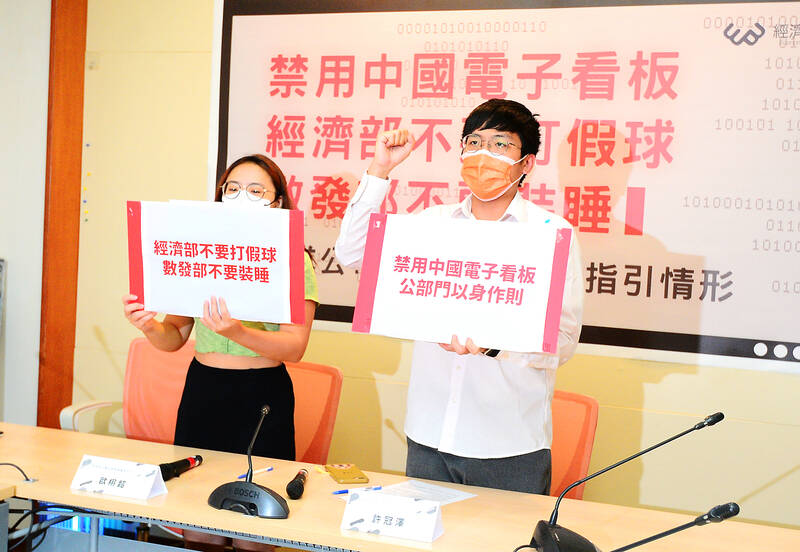People’s movements in public have been exposed and national security has been breached because ministries have failed to enforce a ban of Chinese-made electronic displays and video recording devices, the Economic Democracy Union said yesterday.
Video footage, information and photographs have probably been sent to China, making it a serious issue and a great threat to national security, Economic Democracy Union researcher Hsu Kuan-tze (許冠澤) told a news conference at the legislature in Taipei.
Officials at the Ministry of Economic Affairs and other ministries have neglected their duty, failing to enforce the regulations that prohibit the use of surveillance cameras, electronic displays, telecom devices and software produced in China, Hsu said.

Photo: Wang Yi-sung, Taipei Times
“Due to the well-documented threat to Taiwan’s national security, the ban was put into effect in 2020,” Hsu said. “Last month, the economy ministry revised the regulations to cover devices at businesses, including convenience stores, supermarkets, hypermarts, shopping malls and department stores,” he said.
The revised regulations strictly banned Chinese-made software and apps, “but only asked that businesses avoid using Chinese-made devices,” Hsu said, adding that while the changes were a step in the right direction by asking the private sector to cooperate, they did not go far enough.
However, Economic Democracy Union members have uncovered examples where the rules are not being followed, he said, adding that ministries have been negligent in enforcing the ban.
The University of Taipei, which is administered by the Taipei Department of Education, still has surveillance cameras from China’s Hikvision Digital Technology Co, with a preliminary check of the university’s administrative building showing that there were more than 50 Hikvision cameras installed, he said.
Most likely there are many more on campus, he added.
Hikvision circumvented the restrictions by using its distribution company in Taiwan, Taipei-based DigiFocus Co, Economic Democracy Union researcher Ou Hsu-shao (歐栩韶) said.
“DigiFocus secured a government contract of the economic ministry’s Industrial Development Bureau to supply video cameras and other devices,” Ou said.
“This was a clear contravention of the law, Ou said.
“DigiFocus has Taiwanese skin, but is China’s Hikvision on the inside,” she said. “We demand that the judiciary investigate this serious breach.”
The electronic displays at Taiwan Railways Administration-run stations that were hacked to show messages denigrating US House of Representatives Speaker Nancy Pelosi during her visit early last month had Chinese-made software and were easily penetrated by Chinese hackers, Ou said.
“The lack of scrutiny and enforcement of the ban must be addressed,” she said.
“When surveillance cameras and monitoring devices made by Chinese companies are installed in Taiwan, everyone might be under the eye of the Chinese government,” she said.
“Such devices are installed at most buildings, at the entrances of residential communities, on school campuses, in shopping malls and stores, and on roads to record traffic events,” she said. “If the data are transmitted to China, it is a grave risk to national security and the safety of all residents of Taiwan.”

Chinese Nationalist Party (KMT) Chairman Eric Chu (朱立倫), spokeswoman Yang Chih-yu (楊智伃) and Legislator Hsieh Lung-chieh (謝龍介) would be summoned by police for questioning for leading an illegal assembly on Thursday evening last week, Minister of the Interior Liu Shyh-fang (劉世芳) said today. The three KMT officials led an assembly outside the Taipei City Prosecutors’ Office, a restricted area where public assembly is not allowed, protesting the questioning of several KMT staff and searches of KMT headquarters and offices in a recall petition forgery case. Chu, Yang and Hsieh are all suspected of contravening the Assembly and Parade Act (集會遊行法) by holding

PRAISE: Japanese visitor Takashi Kubota said the Taiwanese temple architecture images showcased in the AI Art Gallery were the most impressive displays he saw Taiwan does not have an official pavilion at the World Expo in Osaka, Japan, because of its diplomatic predicament, but the government-backed Tech World pavilion is drawing interest with its unique recreations of works by Taiwanese artists. The pavilion features an artificial intelligence (AI)-based art gallery showcasing works of famous Taiwanese artists from the Japanese colonial period using innovative technologies. Among its main simulated displays are Eastern gouache paintings by Chen Chin (陳進), Lin Yu-shan (林玉山) and Kuo Hsueh-hu (郭雪湖), who were the three young Taiwanese painters selected for the East Asian Painting exhibition in 1927. Gouache is a water-based

Taiwan would welcome the return of Honduras as a diplomatic ally if its next president decides to make such a move, Minister of Foreign Affairs Lin Chia-lung (林佳龍) said yesterday. “Of course, we would welcome Honduras if they want to restore diplomatic ties with Taiwan after their elections,” Lin said at a meeting of the legislature’s Foreign Affairs and National Defense Committee, when asked to comment on statements made by two of the three Honduran presidential candidates during the presidential campaign in the Central American country. Taiwan is paying close attention to the region as a whole in the wake of a

OFF-TARGET: More than 30,000 participants were expected to take part in the Games next month, but only 6,550 foreign and 19,400 Taiwanese athletes have registered Taipei city councilors yesterday blasted the organizers of next month’s World Masters Games over sudden timetable and venue changes, which they said have caused thousands of participants to back out of the international sporting event, among other organizational issues. They also cited visa delays and political interference by China as reasons many foreign athletes are requesting refunds for the event, to be held from May 17 to 30. Jointly organized by the Taipei and New Taipei City governments, the games have been rocked by numerous controversies since preparations began in 2020. Taipei City Councilor Lin Yen-feng (林延鳳) said yesterday that new measures by